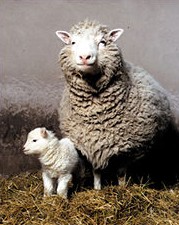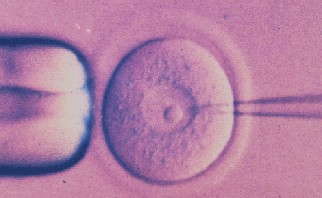|
Rotten Library > Medicine > Cloning
Cloning Officially, there have been no human clones. Just because the technology and knowledge exists, that doesn't mean that mad scientists just rush right off and start doing something.
Officially, there have been no human clones. Just because the technology and knowledge exists, that doesn't mean that mad scientists just rush right off and start doing something.The raw materials for human cloning are pretty basic. Any college biology lab has everything you might need except a reliable technique. Except that there's now a reliable technique, and it's so simple that anyone could have thought of it, pretty much at any time since the discovery of human genetics. To create a clone, you pretty much just vacuum out the inside of a cell and inject it into a viable egg cell. OK, that's a bit of a simplification, but not as much as you would think. This simple formula produced the world's first official mammal clone, Dolly the Sheep. Dolly was a big scientific breakthrough, mitigated only by the disappointment of her sickliness and early death. Dolly proved for the first time in the public arena that cloning works. Needless to say, this development created a generation of newly enthused mad scientists out to create the first human clone.
At the same time, it appeals to some of the baser and more forbidden aspirations of disturbed minds, specifically the desire for eternal life. If you can't life forever in your current form, your clone could take over for you. In a sufficiently advanced future world, your theoretically perfectly fine brain could be transplanted from your old and decrepit body into a fresh young clone body, giving you another 80 years to inflict your amoral sociopathic behavior on an unwitting society. Sure, you'd be murdering a perfectly viable human being (your clone), but since it's an abomination anyway, who gives a fuck? Right? There are a handful of claims that a human clone has already been successfully produced. By far the most famous of these came from a "religious sect" called the Raelians, which is led by a guy named (not surprisingly) Rael. When the Raelians shockingly claimed to have successfully cloned a human being, the major news media went utterly berserk, saturating the airwaves with breathless commentary about the ethical breach of such an experiment and its inevitably life-changing consequences. The primary evidence the Raelians presented to support their claim was the actual press conference at which they announced it. At first, that was enough for journalists. After all, they had a press conference... A PRESS CONFERENCE! Surely they couldn't pull off a press conference without advanced technology.
After these subtle red flags were spotted, the journalists politely asked Rael to cough up the clones. After initially promising to trot them out like circus freaks, the Raelians had a change of heart and vowed to take the secret of the clones' identities to their graves. The Raelians were the latest clone claimers, but hardly the first. In 1978, a controversial book contained a claim that an eccentric millionaire had managed to clone himself. In 1979, a scientist claimed to have cloned human embryos. From time to time, someone pops up and claims to have some finished clones stashed away somewhere, or a few cloned buns in the oven. None of these claims have been anything close to verified. It's probably just as well. Dolly the Sheep died an untimely death at age six, beset by a host of diseases and afflictions. In one study, 10 out of 12 cloned mice died early and with lousy diseases like pneumonia and arthritis. Scientists very recently created the first successful clone of a cat, known as the "cc" kitty. Interestingly, the kitten was remarkably different from its clone donor, with different coloration and a completely different personality, which means that environmental conditions in the womb are far more important to the development of living creatures that previously thought. Score a big one for nurture over nature, and you can officially go back to blaming your parents for all your problems. All these developments suggest that creating a clone is much easier than creating a healthy clone, and that making an exact duplicate of any pre-existing living creature is nearly impossible. Not that mad scientists have historically cared much about that sort of thing, but it does kind of take the thrill out of eternal life. |
 There's something uniquely disturbing about the whole human cloning issue, partly because it challenges our notions of individuality but mostly because of the egotistical fear that someone will do it to you against your will (because, let's face it, you're that damn special).
There's something uniquely disturbing about the whole human cloning issue, partly because it challenges our notions of individuality but mostly because of the egotistical fear that someone will do it to you against your will (because, let's face it, you're that damn special).  Then, the doubts slowly set in. This may have had something to do with the fact that the Raelians claimed to be taking marching orders from
Then, the doubts slowly set in. This may have had something to do with the fact that the Raelians claimed to be taking marching orders from